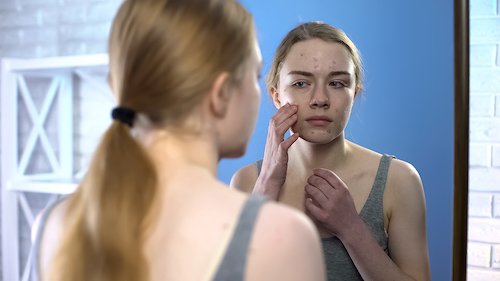 Two in three parents report that their children feel self-conscious about their appearance.
Two in three parents report that their children feel self-conscious about their appearance.
A national poll found that one in five parents report their teens avoid some activities due to their insecurities and one in three parents report their kids have been treated unkindly due to their appearance.
“It was not entirely surprising that so many youth were thought to be self-conscious about some aspect of their appearance, but it was concerning,” Susan Woolford, M.D. ,M.P.H., a child obesity expert and pediatrician at University of Michigan Health C.S. Mott Children’s Hospital told Theravive.
“Particularly, the fact that this was not only an issue for teens, but even young children were impacted, with almost half of the children 8 to 12 years of age reported to have concerns about their appearance too.”
The C.S. Mott Children’s Hospital National Poll on Children’s Health at University of Michigan Health is based on survey responses from 1653 parents with a child between eight and 18.
Almost a third of the parents surveyed said they have noticed their children make negative comments about their own appearance.
The most common causes of insecurities among children and adolescents were weight, acne and skin conditions and hair. Almost one in five parents of girls reported that their child was self-conscious about their breasts.
Parents who had teenagers were more likely to say their child had insecurities about their appearance compared with parents of younger children.
Woolford says this is because as children grow up, they have greater self-awareness and are more likely to compare themselves to others. They may also be influenced by media.
“The role of the media should be addressed. Parents can help children understand that the images they see are not real and that the pictures have all be altered,” she said.
Of the parents who reported their children were self-conscious, one in three said this had a negative impact on their child’s self-esteem, and one in five says it influences whether their child wants to participate in some activities.
Some parents reported their teenager may avoid being in photos, restrict what they eat or try to hide how they look with clothing due to their insecurities.
The poll showed that children and teens may not be alone in having negative thoughts about their appearance. Sometimes this can be reinforced by others, including family.
“Parents reported in the poll that in-person interactions (e.g., with other children, family members and strangers) were the greatest influence on children’s perceptions of their appearance,” Woolford said.
“More than one in four parents shared that their child was treated unkindly because of their appearance, which likely impacts their body image. In addition, social media appears to play a particularly negative role, particularly among youth who were believed to be self-conscious about their appearance.”
The most common response parents took when their child was treated unkindly due to their appearance was to discuss the incident with them. It was less common for the parent to speak to the person who made the comments or keep the child away from that person.
Woolford says the best thing parents can do to help their children from having a negative view of their appearance is to demonstrate that a person’s worth is not tied to their appearance.
“Parents can decrease the likelihood of children developing these concerns by modelling a positive self-image for them. They can also demonstrate, by their words and actions, that a person’s value is not linked to their appearance. Parents can discuss the importance of diversity and help children understand that we are all unique and that is a wonderful thing,” she said.
“When children express concerns about their appearance, parents should speak with them about their concerns and reassure them that most people feel insecure about some aspect of their appearance at times. They can also help them focus on the things that are most vital, who they are as a person on the inside, rather than their appearance on the outside.”
Elizabeth Pratt is a medical journalist and producer. Her work has appeared on Healthline, The Huffington Post, Fox News, The Australian Broadcasting Corporation, The Sydney Morning Herald, News.com.au, Escape, The Cusp and Skyscanner. You can read more of her articles here. Or learn more about Elizabeth and contact her via her LinkedIn and Twitter profiles.